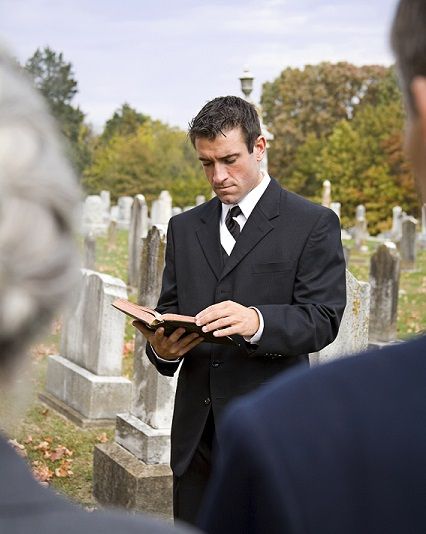
A funeral service addresses what may be a universal need to say goodbye through ceremony. Most religions follow their own practices regarding services, but ceremonial differences may have as much to do with cultural influence as with religion. Funerals themselves may not be inherently religious. They are, in most cases, opportunities for the living to express their emotions regarding the person who has died, and to acknowledge feelings of sadness and loss. It is also a way to allow space for people to share memories of the deceased with one another. A funeral officiant may play an important role in organizing and guiding a service to best meet the needs of the bereaved.
What a Service May Look Like
Many states and local governments have regulations on how a dead body may be handled, but there are no legal ramifications involved with the funeral ceremony itself. Services may be held almost anywhere. Some people may seek the comfort and privacy of an indoor space, whether it is someone's home or a space that caters to group events. Others may wish to hold a celebration of life outdoors. Perhaps the person who died had a favorite spot that seems right for the service, or was someone who just loved being out of doors. A funeral on the open water or on a beach may fulfill the wishes of the person who died. Many people feel that it is important to honor the spirit of their loved one in a way that reflects his or her personality. It may be important to ensure, too, that the site offer the opportunity to say goodbye as naturally and as freely as possible.
Responsibilities of an Officiant
Sensitivity may be the foremost quality of a funeral officiant. It is essential to be aware of and compassionate toward the collective grief of the survivors, as well as to the grief of individual mourners. It is a primary aim of an officiant to do his or her best to make an appropriate and safe space for goodbyes. A well-planned service may be a gift to people who may need someone to help add some structure to the event. An officiant may spend some time prior to the service listening to the thoughts and desires of the family or close friends. A meeting or two may provide enough information for the person leading the service to offer some connection through personal anecdotes that resonate with the attendees. Organizing the readings or a period of time for people to speak and contribute may be an important part of planning the service, as is making space for any selected music. Also, keeping track of any time constraints such as limits on venue rental is essential. Taking care of these kinds of details allows family and friends to focus elsewhere.
After the Service
An officiant may well have assisted with burial or cremation procedures before the service. After, it is not strictly necessary for the officiant to stay until all the mourners have left, but being present for a short while may lend just the kind of support the bereaved need in the moment. Of course, if the officiant had a personal relationship to the deceased or to the family or group, he or she may simply join in as one of the mourners for whatever may ensue after the service.
Keeping the Proper Tone
Another word for officiant in a mourning situation may be facilitator. In a way, it is a job that involves clearing the way for people to do the things they need to do, which are thinking about a loved one and coming to terms with their own feelings of loss. In addition to taking care of all the little details of organizing a service, a facilitator may lend an air of calm through his or her compassionate and dignified composure.
Add Your Comment